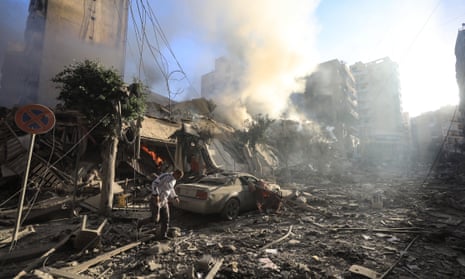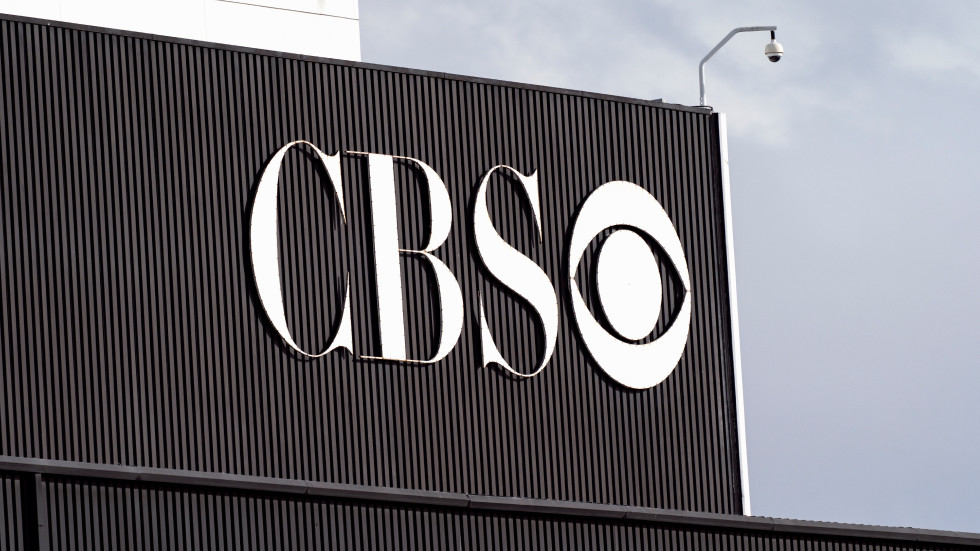Key events Show key events only Please turn on JavaScript to use this feature
The Israeli military says that it has detected around 20 “launches” from Lebanon and that all were either intercepted or fell in an open area.
Opening summary
Hello and welcome to the Guardian’s live coverage of the conflict in the Middle East.
Israel has launched a fresh round of airstrikes on Beirut overnight, with witnesses describing them as more powerful than the massive strike that killed Hezbollah leader Hassan Nasrallah almost a week ago.
Israeli and US media reported that one of the targets of the strikes on the southern suburb of Dahiyeh was Hashem Safieddine, widely considered to be Nasrallah’s likely successor. There has been no official comment from either Hezbollah or Israel on his fate.
The news agency AFP reported that there had been at least 11 consecutive strikes on Dahiyeh, the southern Beirut suburb regarded as a Hezbollah stronghold, while one strike reportedly hit close to Beirut’s airport.
Meanwhile, in the occupied West Bank city of Tulkarm an Israeli airstrike killed at least 18 people in a cafe. The IDF claimed it had killed a local Hamas leader, Zahi Yaser Abd al-Razeq Oufi, in the attack, which levelled the entire building, along with several other Hamas members.
Civilians were also reportedly killed – including a mother and her two children according to Qatar-based broadcaster Al Jazeera – and Palestinian media said it was the bloodiest single Israeli attack on the West Bank in 24 years.
The Israeli newspaper Haaretz reported that more people were buried under the rubble, citing a Red Crescent paramedic and local media.
In other developments:
-
The latest Israeli strikes on Beirut on Friday came after Israeli military ordered civilians near two buildings in Dahiyeh, in the southern suburb of Beirut, to evacuate immediately ahead of airstrikes. An Israeli military spokesperson published maps alongside the announcement, warning civilians to distance themselves at least 500 metres from the sites.
-
Earlier on Thursday, multiple airstrikes were heard in the Lebanese capital, with one of them reportedly hitting the office of Hezbollah’s media department in Dahiyeh, the southern suburbs of Beirut. An official from the media office said they were safe, despite the blast. Israel said it had targeted Hezbollah’s intelligence operation.
-
Joe Biden, the US president, said he was “discussing” possible Israeli strikes on Iranian oil sites in response to Tehran’s missile attack earlier this week. His comments quickly sent oil prices soaring. Asked if he would “allow” Israel to retaliate against Iran, Biden said on Thursday that “we don’t ‘allow’ Israel, we advise Israel. And there is nothing going to happen today.” On Wednesday, Biden said he would not support an Israeli attack on Iranian nuclear sites.

-
Lebanon’s health ministry said 37 people were killed and 151 others wounded in Israeli strikes on the country on Thursday. Nearly 2,000 people have been killed, including 127 children, and 9,384 injured since the start of Israeli attacks on Lebanon over the last year, the country’s health ministry said on Thursday. More than 1.2 million Lebanese people have been displaced by Israeli attacks. Lebanon’s health minister said more than 40 rescuers and firefighters have been killed by Israeli attacks over the last three days.
-
Israel’s military ordered residents of more than 20 towns in south Lebanon to evacuate their homes immediately on Thursday, signaling that it may widen a ground operation launched earlier this week against Hezbollah. Israel has told people to leave Nabatieh, a provincial capital, and other communities north of the Litani River, which formed the northern edge of the UN-declared buffer zone. Israel has previously ordered 52 other villages inside Lebanon to evacuate.
-
The EU’s top diplomat, Josep Borrell, described an Israeli strike on a central Beirut medical centre on Thursday as a “violation of international humanitarian law”. The attack was the second airstrike on central Beirut this week, with most strikes having previously been confined to suburbs in the southern suburbs.
-
Hezbollah carried out new strikes on Thursday, targeting what it called Israel’s “Sakhnin base” for military industries in Haifa Bay on the Mediterranean coast of northern Israel with a salvo of rockets. At least eight Israeli soldiers have been killed in clashes with Hezbollah in southern Lebanon.
-
The Lebanese army said that it returned fire at Israeli forces after one of its soldiers was killed in an Israeli strike, marking the first time that the Lebanese army participated in the fighting against Israel. The soldier was killed when a Lebanese Red Cross convoy accompanied by the Lebanese Army was struck while evacuating wounded from Taybeh, a border-village in southern Lebanon.
-
Civilians are bearing the brunt of a “truly catastrophic” situation in Lebanon, a senior UN official said. Since Israel dramatically ramped up airstrikes in Lebanon more than a week ago, the pace of displacement had exceeded worst case scenarios, Imran Riza, the UN’s resident and humanitarian coordinator, told Reuters. “The level of trauma, the level of fear amongst the population, has been extreme,” he said.
-
G7 leaders expressed “deep concern over the deteriorating situation in the Middle East” and called on regional players to “act responsibility and with restraint”. In a joint statement on Thursday, G7 leaders said they condemned “in the strongest terms” Iran’s military attack against Israel earlier this week, which they said “constitutes a serious threat to regional stability.”
-
Iran has warned Washington that any country that aids an Israeli attack will be deemed an Iranian target. In a statement issued by Iran’s mission at the UN on Thursday, Iran warned that a large Israeli strike will lead to attacks on Israeli infrastructure and that “should any country render assistance to the aggressor, it shall likewise be deemed an accomplice and a legitimate target.” The warnings came as the Iranian president, Masoud Pezeshkian, sought assurances from Gulf States in Doha that they would remain neutral in the event of any joint Israeli-US attack in Iran.
-
The death toll in Gaza has risen to 41,788 reported fatalities with 96,794 people wounded, according to the latest figures by territory’s health ministry late on Thursday. At least 90 Palestinians were killed and 169 others injured in eight attacks by Israel over the last 24 hours, Palestinian news agency Wafa reported earlier, including in strikes on a school and an orphange housing displaced people.
-
Unrwa chief Philippe Lazzarini condemned the Israeli attacks on Thursday, saying “Schools used to be a safe haven for learning, they have now turned into hell for far too many.”
-
The Israeli military said it killed a Hezbollah commander who was responsible for a rocket attack on the Israeli-occupied Golan Heights that killed 12 children and teenagers on a football field in July. The IDF said Khader Shahabiya was killed in an airstrike on Wednesday. The attack on Majdal Shams village, a predominantly Druze village, killed 12 children between the ages of 10 and 16 as they were playing football and wounded dozens more.
-
Israel’s military also announced that in a strike “approximately three months ago” it believes it killed three senior Hamas figures. It named them as “Rawhi Mushtaha, the head of the Hamas government in the Gaza Strip; Sameh al-Siraj, who held the security portfolio on Hamas’ political bureau and Hamas’ labor committee; and Sami Oudeh, commander of Hamas’ general security mechanism.”
-
The Lebanese ambassador to the UK, Rami Mortada, claimed that Hezbollah’s leadership had agreed to a proposed 21 day ceasefire shortly before “hotheads” of Israel blew up the diplomatic path to peace by assassinating leader Hassan Nasrallah. Mortada’s comments on Thursday support a previous assertion made by Lebanese foreign minister, Abdallah Bou Habib.

 By The Guardian (World News) | Created at 2024-10-04 04:55:13 | Updated at 2024-10-18 18:20:38
2 weeks ago
By The Guardian (World News) | Created at 2024-10-04 04:55:13 | Updated at 2024-10-18 18:20:38
2 weeks ago



